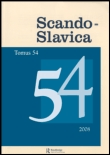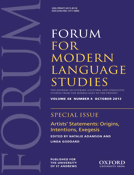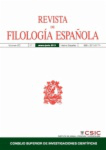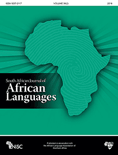
Sibirskii Filologicheskii Zhurnal
metrics 2024
Illuminating the Depths of Language and Literary Theory
Introduction
Sibirskii Filologicheskii Zhurnal is a prestigious academic journal published by the Russian Academy of Sciences, Institute of Cytology and Genetics. With ISSN 1813-7083, it is dedicated to advancing research in the fields of Cultural Studies, Linguistics and Language, and Literature and Literary Theory, and has achieved notable rankings, including Q2 in Cultural Studies and Linguistics, and Q1 in Literature for 2023. The journal provides a platform for scholarly discourse, contributing valuable insights to its fields with an evolving scope that spans from 2018 to 2024. Though not an open-access journal, Sibirskii Filologicheskii Zhurnal serves as a vital resource for researchers, professionals, and students in the Russian Federation and beyond, fostering a deeper understanding of linguistic and literary phenomena. Its commitment to high-quality content makes it an essential addition to any academic's library.
Metrics 2024
 0.22
0.22 0.20
0.20 0.10
0.10 3
3Metrics History
Rank 2024
Scopus
JCI (Web Of Science)
Quartile History
Similar Journals

Scando-Slavica
Unveiling the Complexities of Cultural ExchangesScando-Slavica is a renowned academic journal published by ROUTLEDGE JOURNALS, TAYLOR & FRANCIS LTD, specializing in the rich interplay of Scandinavian and Slavic studies. With its ISSN 0080-6765 and E-ISSN 1600-082X, the journal has been a critical resource for scholars since its inception in 1954, covering a wide range of disciplines including archaeology, cultural studies, history, linguistics, and literature. As of 2023, it has consistently ranked in the third quartile across various categories, indicating its influential role in disseminating innovative research within the arts and humanities. With a focus on interdisciplinary dialogue, Scando-Slavica aims to foster a deeper understanding of cultural exchanges and linguistic connections, making it an essential read for researchers, professionals, and students interested in exploring the complexities of Nordic and Slavic interactions. While currently not an open access journal, its contributions have garnered substantial citations, bolstering its academic impact and relevance in a diverse scholarly landscape.

FORUM FOR MODERN LANGUAGE STUDIES
Fostering Scholarly Dialogue on Language and LiteratureFORUM FOR MODERN LANGUAGE STUDIES is a prestigious academic journal published by Oxford University Press that has been serving the fields of literature and linguistics since its inception in 1965. This journal, with an ISSN of 0015-8518 and an E-ISSN of 1471-6860, plays a crucial role in advancing scholarly discourse on modern language studies, including literature and literary theory. With an impactful presence in both the linguistic and literary domains, it has been recognized in 2023 with a category ranking of Q2 in Literature and Literary Theory and Q3 in Linguistics and Language. It stands out in the competitive landscape, holding a notable position within Scopus rankings, including a 70th percentile ranking in Literature & Literary Theory. While the journal currently does not offer open access options, it remains a vital resource for researchers, educators, and students passionate about the transformative power of language and literature. Its commitment to quality research and robust academic discussion underscores its importance, making it a key platform for those aiming to contribute to modern language scholarship.

Cuadernos de Rusistica Espanola
Bridging Cultures through Language and LiteratureCuadernos de Rusistica Española is an esteemed scholarly journal dedicated to the field of Spanish and Russian studies, published by EDITORIAL UNIV GRANADA. With its commitment to Open Access since 2005, the journal fosters wide dissemination of knowledge and research, aiding scholars and students alike in exploring the intricate connections between Spanish and Russian linguistics, literature, and cultural studies. Based in Granada, Spain, the journal spans a broad scope of topics, making it a crucial resource for researchers aiming to advance understanding in comparative literature, language studies, and interdisciplinary approaches. The ISSN for the print version is 1698-322X and for the online version, 2340-8146. As an open-access platform, it increases accessibility and engagement with cutting-edge research findings, making it a vital contribution to the academic community.

Revista da Anpoll
Empowering academics with free access to vital findings.Revista da Anpoll is a prestigious academic journal dedicated to the fields of Letters and Linguistics, published by the ASSOC NAC POS-GRADUACAO PESQUISA LETRAS & LINGUISTICA in Brasilia, Brazil. Since its inception in 1994, this Open Access journal has aimed to foster scholarly communication and lead discourse in the linguistic and literary disciplines, allowing researchers and practitioners free access to cutting-edge research and findings. Although it does not currently have an H-index, the journal continues to attract high-quality submissions from experts in its field, contributing to the global academic community. By offering a platform for innovative studies and discussions, Revista da Anpoll plays a critical role in advancing knowledge and practice within linguistics and literary studies, making it an invaluable resource for academics, professionals, and students alike.

Caplletra
Exploring the Boundaries of Language and LinguisticsCaplletra is a distinguished open-access journal dedicated to the field of linguistics and language studies, published by PUBL ABADIA MONTSERRAT since its inception. Based in Barcelona, Spain, this journal has been a vital resource for researchers, professionals, and students engaged in the intricate explorations of language and its applications since its transition to open access in 2005. Despite its current quartile ranking of Q4 within the Linguistics and Language category as of 2023, Caplletra continues to serve as an inclusive platform, fostering a dialogue that encourages a diverse range of scholarly contributions. Covering an expansive scope in the converged years from 2018 to 2024, it plays a crucial role in disseminating innovative research and insights. With its ISSN 0214-8188 and E-ISSN 2386-7159, Caplletra is committed to making academic work accessible to all, enhancing the landscape of linguistic scholarship and reflecting the evolving nature of language studies.

Folia Linguistica et Litteraria
Exploring the Interplay of Language and LiteratureFolia Linguistica et Litteraria, published by the University of Montenegro's Institute of Language and Literature, is an esteemed academic journal that provides a vital platform for the exploration and discourse in the fields of Linguistics and Literary Theory. With an ISSN of 1800-8542, this journal serves as a significant resource for researchers, educators, and students alike, fostering an understanding of language, literature, and their interrelationship. Having established its presence in the scholarly community, Folia Linguistica et Litteraria has been ranked in the 2023 quartiles, achieving Q3 in Linguistics and Language, and Q2 in Literature and Literary Theory, indicating its growing influence and relevance. Its Scopus rankings further underscore the journal’s commitment to high-quality research, reflecting its standing within the arts and social sciences. While the journal operates without open access, its rigorous peer-review process ensures that only the most impactful studies are published. As it converges its focus from 2019 to 2024, this journal invites contributions that challenge conventional boundaries, encouraging interdisciplinary dialogue and innovative research in the rich fields of linguistics and literary studies.

Moenia-Revista Lucense de Linguistica & Literatura
Illuminating the Rich Tapestry of Linguistic and Literary TheoryMoenia-Revista Lucense de Linguistica & Literatura, published by the esteemed Universidad de Santiago de Compostela, is a crucial academic journal dedicated to the fields of linguistics and literary studies. With its ISSN 1137-2346 and E-ISSN 2340-003X, this journal aims to advance scholarly discourse and provide a platform for innovative research in both linguistics and literature, with a particular focus on linguistic theories, literary analysis, and interdisciplinary approaches. The journal is categorized in the lower quartile (Q4) in its respective fields according to the latest metrics, including Scopus rankings, which place it within the challenges of the arts and humanities. Although currently not open access, it serves as an accessible resource for researchers and enthusiasts alike who are keen to explore diverse methodologies and theoretical frameworks. With its commitment to fostering rigorous academic inquiry, Moenia stands as a vital resource for those looking to deepen their understanding of the intricate relationships between language and literature.

REVISTA DE FILOLOGIA ESPANOLA
Pioneering Discoveries in the Art of Language and LiteratureREVISTA DE FILOLOGIA ESPANOLA is a distinguished academic journal dedicated to the fields of linguistics and literature, published by the CONSEJO SUPERIOR INVESTIGACIONES CIENTIFICAS (CSIC) since 1954, and has been an Open Access journal since its inception. Situated in Madrid, Spain, this journal has emerged as a crucial platform for the dissemination of scholarly research, with notable rankings including Q2 in Linguistics and Language and Q1 in Literature and Literary Theory as of 2023. The journal's commitment to fostering academic dialogue is reflected in its impressive Scopus rankings, including a 79th percentile in the Arts and Humanities for Literature and Literary Theory. Covering a wide range of topics from linguistic theory to literary critique, REVISTA DE FILOLOGIA ESPANOLA is essential reading for researchers, professionals, and students alike, providing valuable insights and cutting-edge research in the ever-evolving landscape of Spanish philology.

Vestnik Sankt-Peterburgskogo Universiteta-Yazyk i Literatura
Bridging Language and Literary Theory for a Deeper UnderstandingVestnik Sankt-Peterburgskogo Universiteta-Yazyk i Literatura, published by ST PETERSBURG UNIV PRESS, stands as a pivotal academic journal in the fields of linguistics and literature, reflecting a profound commitment to the exploration of language and literary theory. With an ISSN of 2541-9358, this journal has steadily built its reputation since its inception in 2017, achieving impressive rankings in Scopus that place it within the top tiers of its categories—Q2 in Linguistics and Language and Q1 in Literature and Literary Theory as of 2023. The journal serves as an essential platform for researchers, professionals, and students who are keen to delve into the complex interactions between language and literature. Although currently not offering Open Access, its contributions are invaluable to advancing scholarly dialogue and fostering understanding within these vibrant fields. With a converged publication timeline extending through 2024, Vestnik Sankt-Peterburgskogo Universiteta-Yazyk i Literatura exemplifies the ongoing commitment to high-quality research and critical thought, making it an indispensable resource for those dedicated to the study of language and its literary manifestations.

South African Journal of African Languages
Championing scholarly excellence in African language studies.The South African Journal of African Languages, published by Routledge Journals, Taylor & Francis Ltd, is a premier academic resource dedicated to the advancement of research in the fields of linguistics, language, and literary theory. Since its inception in 1996, this journal has been pivotal in fostering scholarly discourse around African languages, contributing significantly to our understanding of cultural and linguistic diversity across the continent. With its impressive categorization in 2023 as Q2 in Linguistics and Language and Q1 in Literature and Literary Theory, the journal attracts high-quality research and innovative perspectives, positioning itself among the leading publications in the relevant academic arenas. Researchers and students alike will find valuable insights within its pages, as it consistently ranks in the top percentiles of Scopus, notably achieving an 81st percentile in Literature and Literary Theory. The journal is committed to enhancing accessibility to research, although it currently does not offer Open Access options. Its scope includes an array of topics related to language policy, linguistic preservation, and literary critique, making it an essential resource for those engaged in the rich tapestry of African linguistics and literature.